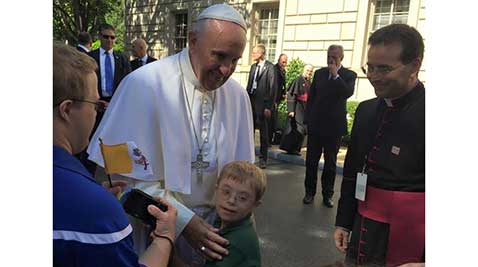ANNAPOLIS — With Pope Francis’ visit to Washington, D.C., Sept. 23, the Maryland-based Catholic Coalition for Special Education hoped his arrival would boost attention and support for the organization.

But one of the families the coalition sent to the Apostolic Nunciature, the Sloans, didn’t just catch a glimpse of the pope — 7-year-old Eddie Sloan, who has Down syndrome, shared a hug with him.
“I know the pope has quite a heart for children and especially children with disabilities,” said Eddie’s mother, Melissa Sloan, noting that she stood with her son and daughter for about three hours in anticipation. “To see someone so special and so holy, and to see Eddie want to be close to him, it’s kind of indescribable. And hopefully, it will also get the word out of why we were there.”
Eddie attends St. John the Evangelist School in Silver Spring, along with his sister, Gianna, 5. While he receives extra reading support and special education accommodations he needs, he gets it while sitting in a mainstream classroom with everyone else his age, Melissa Sloan said.
“I‘ve always loved the idea of inclusive Catholic education … I wanted a place where all (my children) could all go to school together,” Melissa Sloan said. “The biggest thing is that the teachers are really excited about having him there. They do everything they can to make him feel welcome.”
Students with disabilities in 26 Catholic schools across the state can receive accommodations they need, thanks to the coalition, a nonprofit organization that helps Catholic schools in the Archdiocese of Washington and Baltimore acquire resources for students with intellectual or learning disabilities.
Denise Garman, the student support services director in the Archdiocese of Baltimore, said the coalition refutes that Catholic schools cannot accommodate students with special needs, and also helps keep up with the growing demand.
“Historically, Catholic schools did not serve students with special learning differences. That has totally changed, and we wanted it to change,” Garman said. “The need is great, we are seeing more and more students that have some kind of learning difference or concern, and we want to keep them in our Catholic schools.”
The coalition celebrated its 10th year of awarding money to Catholic schools Sept. 20, and announced they gave $66,000 to seven schools this academic year.
But there’s still a gap between the amount of money schools need to implement or keep these services afloat and how much money the coalition can award, said Francesca Pellegrino, the organization’s founder and president. Since its inception, the coalition has awarded about $800,000 to 26 schools but has received about $4 million in grant requests.
“We’re a very small organization, and supporting people with disabilities can sometimes be hard,” Pellegrino said.
The grants come through fundraising and help pay for piloting special education programs in schools, hiring special education teachers and aides and offering technical assistance.
“When you’re teaching students with intellectual disabilities, you have to modify the curriculum to ensure what’s appropriate,” Pellegrino said.
There’s no standardized inclusion policy for Catholic schools or public schools, however, and the services offered vary school-by-school, according to different students’ needs, said Carol Quirk, the executive director of the Maryland Coalition for Inclusive Education — a non-profit organization that works toward including students with disabilities in all schools.
Pellegrino created the Catholic Coalition for Special Education in 2004 while she was looking for Catholic inclusive education for her son, Alex, she said.

“They really didn’t have a program, they didn’t have special education teachers, they just didn’t have the necessary skills (for my son),” Pellegrino said.
The organization has grown and she said she hopes to make inclusive Catholic education for all students with disabilities widespread, continuing to look for ways to fundraise.
Katy Prebble, president of the all-girls Academy of the Holy Cross high school in Kensington, said five girls there need special accommodations, and she anticipates that number to grow.
The best part about the services, Prebble said, is how the teachers welcome every student with open arms.
“Each one of (the five students) is different from the other,” Prebble said. “Each side learns from each other and understands what they bring to the table.”
Now that the pope has made a visit to the area, he recognized a student affiliated with the organization, and a coalition video welcoming the pope aired before the 4:30 p.m. canonization Mass Sept. 23, organization officials hope its presence has been reinforced.
“We hope that people will be moved to donate to CCSE, we hope that this might help the schools open their minds, their hearts and their possibilities,” Pellegrino said. “(The Pope) has a real heart for the marginalized, and I think people with disabilities are overall marginalized.”
Prebble said the message the pope is sending about all people applies to all students of every kind, no matter the disability. She noted his mission ties in to the importance of inclusive education in Catholic schools.
“Pope Francis’ message is that we’re all God’s children — period,” she said. “We have to all embrace each other … it’s just one message and we’re all part of the same family and all obligated to take care of each other.”
Melissa Sloan mentioned she would like to see inclusive Catholic education become the norm and more widespread. It’s more beneficial for every student in the classroom if everyone is taught together, she said.
“It’s good for the students socially, but also as a Catholic,” Sloan said. “If we’re going to accept all children and value all children, especially children with Down syndrome, it’s important to have our Catholic schools stand up for that.”


You must be logged in to post a comment.